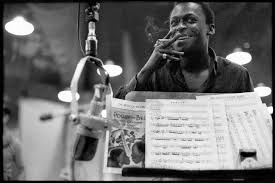
I have been and still am a seeker, but I have ceased to question stars and books; I have begun to listen to the teaching my blood whispers to me.”
Hermann Hesse
When we listen to the best Jazz musicians play, we are often struck by their seemingly effortless ability to improvise and create fresh, new music as they play. Miles Davis, for instance, is reported to have been happy if his fellow musicians played a wrong chord. Rather than getting upset, he relished the opportunity that the unexpected , discordant melody provided. Something new and interesting could now appear and be developed as they continued to improvise round the “mistake”.
One of the things separating musicians of this calibre from the rest of us mere mortals, is the absolute confidence they possess in their ability to play their instrument. Many hours spent in solitary, deliberate practice has given them the necessary mastery over the instrument that they have chosen to play. Alongside this technical mastery and control, they accumulate a deep understanding of what it is possible to achieve. This leaves them free to ‘play’ with the music as they play the music.
If we want to live with the same sense of freedom that such mastery provides, then we need to approach the whole process of living with the same improvisational attitude. If we are to be able to improvise in life we need to develop a personal sense of mastery. Setting out to become experts in our own lives, fully cognizant of what is possible for us to achieve when we use our minds to the full. Becoming aware of how we have learnt to think and behave in various circumstances
This requires that we invest the time and effort that is needed if we are to absorb the relevant expertise and knowledge to enable us to excel at what we do. If we are lucky, we learn habits and skills such as grit and determination that allow this to happen as we grow up and develop throughout our childhood.
An inquisitive approach to the world is vital if we are to live lives that are creative rather than reactive. This is why many of those who are regarded as experts in their fields, and who are seen as successful, report spending so much time on self-development.
It is said that an amateur musician practices until they can play a piece of music right. A professional musician, on the other hand, practices until they are unable to play a piece of music wrong. The result of this dedication to their craft is that they can concentrate on playing music, giving it their own interpretation, instead of mechanically playing the notes as written on the page.
When we start to develop mastery over our lives, we can begin to live flexibly, both in how we act, and how we choose to think. We can use this flexible approach to adapt rapidly, and successfully, to the changing circumstances of our lives as they unfold.
The cognitive flexibility that comes from knowing how our mind works, allows us to approach life with greater confidence. Then we are able to confront, and even thrive on the challenges thrown up by the complex environment of constant change that is an integral part of life.
When we have such an uncluttered, adaptive mindset we can look for the opportunities offered by the situation, rather than becoming paralysed by the sense of dread that comes from reacting automatically with behaviours and patterns of thought that we have learned in the past.
As we continue to develop a Minimalist Mind we put ourselves in the lucky position of knowing our mental strengths and limitations, we can then choose to factor these into the way we live. Building on the things we are aware we do well and actively developing those areas where we are relatively weak.
Sandy
asinglepoint.blog
